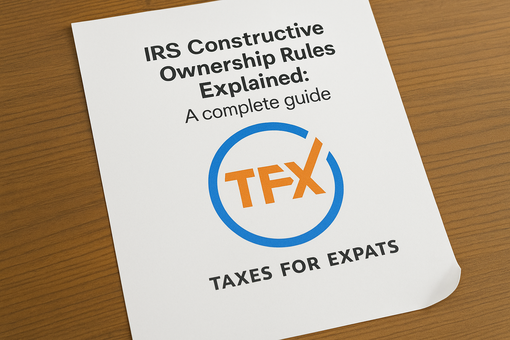Maximizing your retirement contributions: Navigating IRA limits for 2024
In today's ever-changing global economy, the push towards retirement savings is more critical than ever.
With the stock market's ups and downs, yet overall upward trajectory, savvy investors are looking to bolster their financial futures.
It's essential, however, to approach this with caution — especially for expats dealing with unique tax challenges — to ensure investments are not only growing but also strategically protected from potential setbacks.
The annual update to IRA contribution limits is a key factor in retirement planning.
For 2024, these limits have been adjusted to align with the evolving economic environment, providing a prime opportunity for individuals to enhance their retirement reserves.
Understanding IRA contribution limits in 2024
For 2024, the IRS has updated both IRA and Roth IRA contribution limits to $7,000 for those under 50, with an additional $1,000 "catch-up" allowance for individuals 50 and older, totaling $8,000.
This increase is more than a mere adjustment; it's a strategic opportunity for enhancing retirement savings, especially crucial for those nearing retirement who need to accelerate their savings efforts.
Key points:
- 2024 IRA contribution limits: $7,000 for individuals under 50; $8,000 for those 50+.
- Significance of catch-up contributions: Enables older savers to compensate for any delayed start in saving or to recover from financial setbacks.
- Importance of strategic planning: Ensuring contributions align with these limits is vital to avoid penalties and optimize tax benefits. This is particularly pertinent for expats, who must navigate additional tax considerations.
In essence, the updated IRA contribution limits for 2024 offer a beacon for individuals navigating the path to retirement.
By fully understanding and leveraging these limits, investors can avoid penalties, maximize their savings, and take a significant step toward a secure financial future.
The impact of a flourishing stock market on your IRA
A robust stock market presents a golden opportunity for investors, particularly those contributing to IRAs.
The allure of high returns tempts many to adjust their investment strategies, often skewing more aggressively towards equities. However, this approach is a double-edged sword.
While the potential for growth is undeniable, the risk of volatility looms large, making it essential for investors to balance their quest for returns with the need for risk management.
In a bullish market, the temptation to chase performance can lead investors to overlook the foundational principles of retirement planning: diversification, patience, and long-term perspective.
This wisdom underscores the importance of not letting current market trends derail a well-considered investment strategy tailored to one's retirement goals and risk tolerance.
While increasing contributions to leverage market upswings might seem prudent, it's vital to ensure these moves align with a broader retirement planning strategy.
This might include rebalancing portfolios to maintain a desired asset allocation or considering dollar-cost averaging to mitigate the impact of market volatility.
Simplifying retirement savings for expats
For expatriates, the path to retirement savings is strewn with unique challenges and opportunities.
From intricate tax implications to stringent reporting requirements, the expat investor must tread carefully to optimize their IRA contributions and avoid the snares of penalties and inefficiencies.
Here's a closer look at the hurdles and how to leap over them:
Understanding tax treaties and the FEIE
- Tax treaties: The US has income tax treaties with several countries, which can affect how your retirement savings and withdrawals are taxed. For instance, some treaties allow US citizens to exclude contributions to foreign pension plans from their taxable income.
- Foreign Earned Income Exclusion (FEIE): For the 2024 tax year, the FEIE allows you to exclude up to $112,000 of foreign earnings from US taxes. This exclusion can impact the taxable income you report, potentially affecting your IRA contribution room.
Reporting requirements: A snapshot
Expats must be vigilant with their reporting to avoid penalties.
Key requirements include:
- FBAR (Foreign Bank and Financial Accounts Report): If you have financial accounts outside the US exceeding $10,000 at any point during the year, you must file an FBAR.
- FATCA (Foreign Account Tax Compliance Act): US taxpayers with foreign financial assets exceeding certain thresholds ($200,000 for individuals living abroad at the end of the tax year or $300,000 at any point during the year) must report these under FATCA.
Also read - FATCA reporting & filing requirements
Pro tips for expat IRA contributions
-
Maximize your contributions: For 2024, aim to contribute up to the limit of $7,000, or $8,000 if you're 50 or older.
NB! Contributions to a Roth IRA might be limited based on your modified adjusted gross income (MAGI). - Strategize with the FEIE: If using the FEIE, ensure your remaining income qualifies you to contribute to an IRA. Your ability to contribute is based on your taxable income after the FEIE application.
-
Mind the currency fluctuations: Currency exchange rates can significantly impact the value of your contributions and distributions.
Pro tip. Keep an eye on these fluctuations and plan your contributions and withdrawals accordingly. - Consult the experts: CPAs and EAs expertise can guide you through optimizing your IRA contributions, ensuring compliance, and leveraging tax treaties and exclusions to your advantage.
Contributing to a traditional IRA is a smart way to lower your taxable income, and you have until the tax filing deadline in April to do so. On the flip side, if you find that you contributed more than allowed, you can withdraw the excess amount along with any earnings on it by the same deadline to avoid the 6% penalty.
Strategies for maximizing your IRA contributions
Maximizing your IRA contributions requires a blend of strategic timing, diversified investments, and professional guidance.
Here’s how you can enhance your retirement savings:
1. Strategic timing
Aligning your contributions with market trends can significantly impact your IRA's growth.
Consider making contributions early in the year to maximize compounding interest: Your money will have almost 15 months and a half to “work for you.” If you invest $5,000 annually in an IRA at a 7% annual return, waiting until the last minute each year could cost you over $100,000 in potential earnings over 30 years.
You can also time your contributions to coincide with market dips to buy more shares at lower prices.
2. Diversified Investments
Diversification is key to mitigating risks while aiming for higher returns.
Spread your investments across various asset classes, including stocks, bonds, and mutual funds, to create a balanced portfolio that can weather market volatility.
3. Leveraging tax pro help
With TFX by your side, you're not just avoiding pitfalls; you're strategically advancing toward your retirement goals.
Our CPAs’ tailored advice can help you:
- Understand the nuances of tax treaties and the FEIE and how they apply to your situation.
- Navigate the reporting requirements with ease, ensuring full compliance and peace of mind.
- Optimize your IRA contributions in the context of your global income and tax obligations.
In the world of expat finance, knowledge is power, and the right partner makes all the difference.
Taxes for ExpatsⓇ is more than a service provider: we're your strategic ally in securing a prosperous retirement, wherever your journey takes you.
Never had a pro tax help before?
Check out how it works
Looking beyond 2024: Long-term retirement planning
The journey to a secure retirement doesn’t end with understanding the 2024 IRA contribution limits.
It’s about staying informed and considering a broad spectrum of savings vehicles:
- Stay updated: Keep abreast of changes in IRA contribution limits and tax laws to ensure your retirement planning remains on track. The IRS website is a valuable resource for the latest guidelines on IRA contributions and deductions.
- Broaden your horizon: While IRAs are a cornerstone of retirement planning, exploring other savings vehicles like 401(k)s, SEP IRAs, and health savings accounts (HSAs) can provide additional avenues for tax-advantaged savings.
- Think long-term: Retirement planning is a marathon, not a sprint. Adopting a long-term perspective helps you make informed decisions that align with your retirement goals, rather than reacting to short-term market fluctuations.
Bottom line
In wrapping up, the essence of successful retirement planning lies in understanding the nuances of IRA contributions, leveraging market trends, and diversifying investments.
As we navigate the complexities of the financial landscape, the importance of professional advice cannot be overstated.
We encourage you to start or continue investing in your IRA with a strategic approach focused on long-term growth. For expatriates, navigating the additional layer of tax considerations requires expert guidance.
Unsure of each piece to be filed?
Get your free tax consultation
FAQ
In 2024, the maximum contribution to a SEP IRA is $69,000, an increase from previous years. This limit is subject to a cap of 25% of the contributor's earnings.
The SIMPLE IRA contribution limit for 2024 is $16,000 for employees, with an additional catch-up contribution limit of $3,500 for those aged 50 and above, maintaining the previous year's catch-up limit.
The 2-year rule for SIMPLE IRAs permits tax-free rollovers to other non-Roth IRA types or employer-sponsored plans after two years from the initial contribution. Rollovers into a Roth IRA are also allowed after this period, though they may incur taxable income on untaxed amounts.


